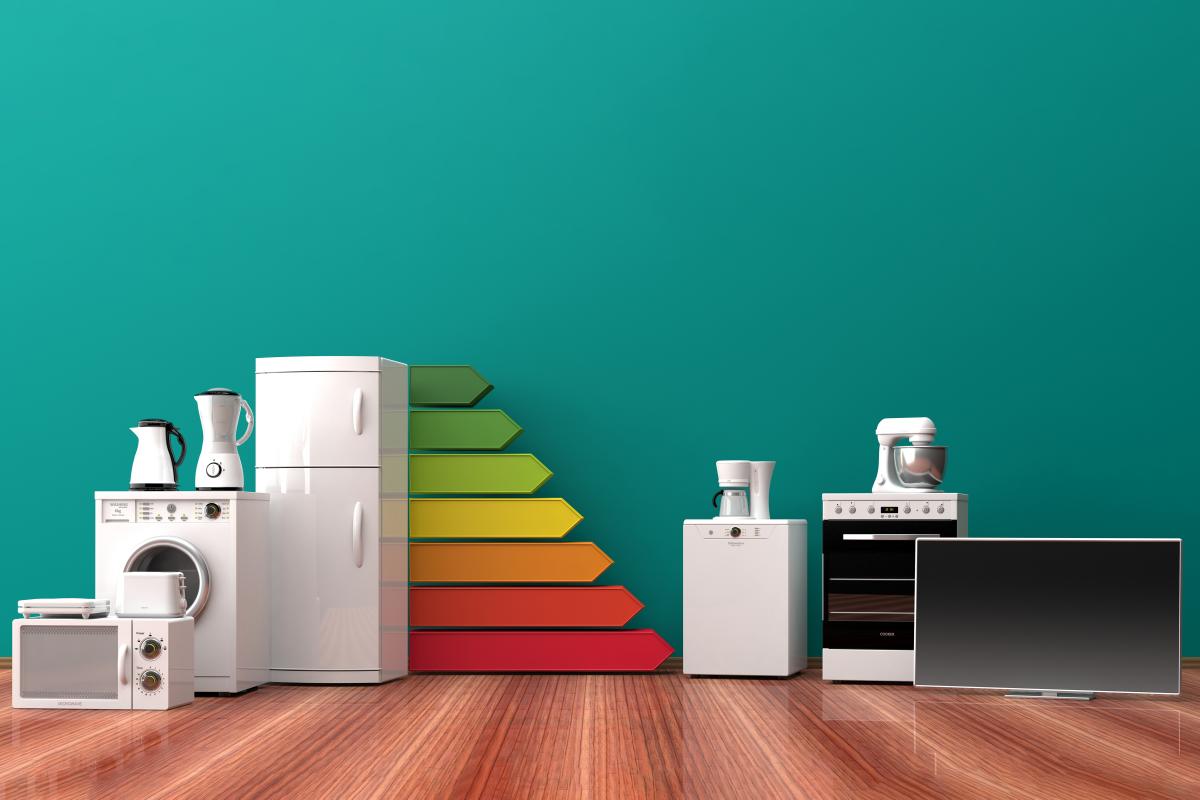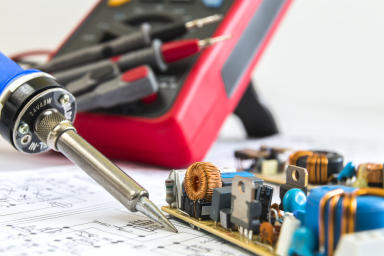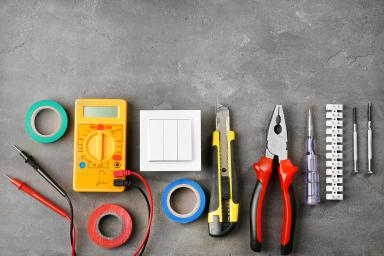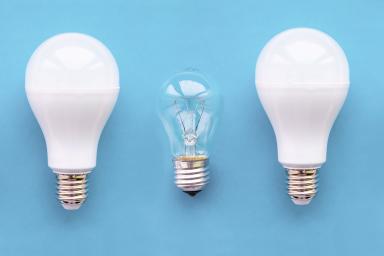Home Energy Guide: Energy Efficient Appliances

Did you know it costs almost as much to power your appliances as any other part of your home? As technology becomes more and more integrated into our lives, it has steadily become a larger percentage of our rising electricity use.1 Fortunately, you’re not helpless in the fight against higher monthly bills.

While federal energy efficiency standards have created more efficient appliances, there are still many devices throughout your home that constantly drain power. Everything from hair dryers to video game systems to coffee makers has an efficient and inefficient way to be used. And while most small appliances cost less than $50 a year in energy bills, the more devices you have in your home, the more it adds up.
With a few simple tweaks, you can make your appliance use more energy efficient, saving you money and reducing your environmental footprint. We’ve put together this guide to give you some easy to follow suggestions for DIY energy efficiency tasks around the house. We’ve also suggested projects that might need more expert advice, so we’ve offered some tips for finding and hiring people who can help you save money on your energy bills. Let’s get started!
DIY Energy Saving Tips
There are several ways you can make your appliances a smaller monthly expense, with minimal time commitment or cost. Here are some ideas of DIY projects and simple tips for saving energy.
Use a power strip: Many appliances and AC adapters draw energy when plugged in, even if they’re not turned on or connected to a machine. In total, this "vampire energy" costs the average U.S. household more than $100 per year.2
Using a power strip with individual switches to shut off individual outlets when appliances are not in use could significantly cut into those standby power costs.
Insulate water heaters: You can insulate your water heater in about 90 minutes, and it can save you between $20-$45 each year.3
Insulating blankets for water heaters run around $20 a piece, but some utility companies offer discounts or rebates, making them virtually free. The basic steps include turning off the water heater, measuring the blanket to size, cutting out spaces for the controls, and taping the blanket into place. You can check out the detailed project guide at energy.gov.
Let dishes and clothes air dry: Your clothes can be hung inside or outside (if the weather permits) to air dry, eliminating your need to run your dryer. An added
benefit to hang drying is your clothes will last longer, as the fibers won’t be overheated, shrunk, or lose color. However, you may still want to use a dryer for heavier fabrics such as towels and comforters. You can also save electricity by letting your dishes air dry. Many dishwashers have a setting that stops the cycle after washing and rinsing, rather than using hot air. This can cut your dishwasher’s electricity use by as much as 15%!
Check refrigerator and freezer temps: Your refrigerator should be set between 35°and 38°F. Freezers should be set to 0°F. If your refrigerator and freezer are set below those ideal temperatures, change the settings to keep them from unnecessary cooling.

Unplug chargers: Chargers for cell phones, laptops, reusable batteries, video game systems, tablets, and eBook readers draw electricity even when not in use. Plug them in only when needed.4
Use appropriate appliances: Don’t use your stove for a small, one-person meal. Use your toaster oven or microwave instead. It takes energy to heat up the whole inside of the oven, which is unnecessary if you’re only using a small portion of it.
Minimize hot water use: The average household spends $400-600 per year on water heating alone. Saving is simple— the less hot water you use, the lower your energy bills will be. Use the cold water cycle in your washing machine, only run the dishwasher when it’s full, turn off faucets when not in use, and cut down on time spent in the shower. If you’re looking for even more ways to cut down on hot water, check out our water efficiency guide.
Use Energy Star products: Products with the Energy Star label exceed the federal minimum standard for appliance energy efficiency. For example, Energy Star refrigerators use 15% less energy than non-Energy Star models, and Energy Star dishwasher use more than 50% less water per cycle than standard models.5
Projects for an Appliance Professional
There are many DIY projects and hacks to lower your energy bills, but it may take some professional assistance to make the biggest dents in your energy bills. For your larger home appliances, here are a few popular options that could result in major savings.
Schedule Regular Appliance Maintenance: Major appliances such as your HVAC unit, water heater, electrical system, furnace, and ducts should be checked at least yearly. Regular wear and tear can kill an appliance’s efficiency, and multiply your energy spending.
Many service companies offer maintenance plans that include checking on your appliances twice a year, usually right before summer and winter to be sure your equipment is ready to withstand the high and low temperatures of the seasons. While this may add to your seasonal expenses, keep in mind appliance maintenance is much more affordable than appliance repair or replacement.
Schedule a home energy audit: A home energy audit can give you detailed information about where your house is losing the most energy. Making upgrades based on your home energy audit can save you 5-30% on your energy bills.6
How to Hire a Home Energy Auditor
A professional home energy auditor will come to your home to assess its energy efficiency, as well as point out any potential health or safety hazards. They are trained to find ways to save you money by assessing your appliances and checking your home for unnecessary and hidden energy usage. The auditor will also analyze past energy bills to understand your home and family’s level of energy consumption.
Hiring a home energy auditor is easy, but take the following precautions to make sure you’re working with a true expert.

For more help, check out our guide to hire home remodelers that features several great tips for hiring experts to work on your home.
Conclusion
Saving energy is not only good for the environment; it’s good for your wallet. Appliances cause an extraordinary amount of unnecessary electrical usage. Even when something isn’t running it can be drawing power, which slowly takes away money out of your wallet. A few simple tricks to use with appliances at home can go a long way toward saving you money. And when you’re ready for bigger projects with larger energy savings rewards, look for an expert who can save you time and money!
Laurence KolbAuthor
Laurence has more than 30 years of experience as a licensed electrician and general contractor, focusing on building, lighting, and electrical services. He currently holds two California licenses, C10 - Electrical and B – General.
Over the course of his career, Laurence has worked on industrial, commercial, and residential projects in Los Angeles, San Francisco, and San Diego.
Sources
1. http://www.eia.gov/todayinenergy/detail.cfm?id=102712. http://energy.gov/energysaver/articles/tips-appliances
3. http://www.energy.gov/energysaver/projects/savings-project-insulate-your-water-heater-tank
4. https://www.entrustenergy.com/blog
5. http://energy.gov/energysaver/articles/tips-kitchen-appliances
6. http://www.energy.gov/articles/energy-saver-101-infographic-home-energy-audits




